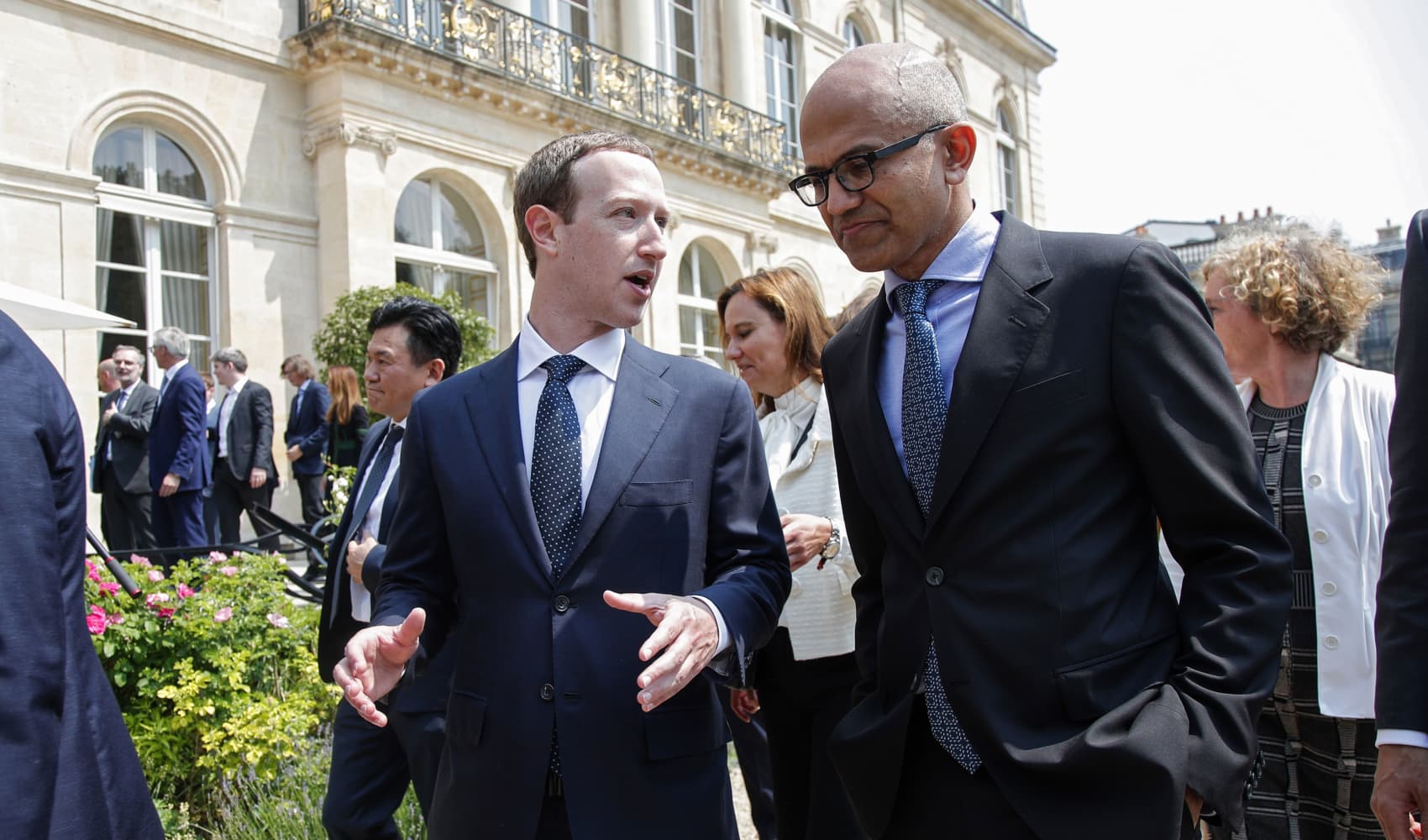Meta's AI Gamble: Will Trump's Tariffs Crash the Party?
Meta's AI Gamble: Will Trump's Tariffs Derail Zuckerberg's Vision?
Introduction: The AI Arms Race and the Trump Tariff Wildcard
Mark Zuckerberg has made it clear: Meta is going all-in on artificial intelligence. Think of it as a massive bet on the future, a digital moonshot aimed at making Meta the undisputed AI champion. But every high-stakes poker game has its wild cards, and in this case, it’s the potential return of President Donald Trump and his famously unpredictable, tariff-heavy trade policies. Will these policies throw a wrench into Meta's carefully laid plans? That's the billion-dollar question (or rather, the $65 billion question!).
Meta's AI Ambitions: A $65 Billion Bet
Let’s be clear: Meta isn't dipping its toes into AI; it's diving headfirst. Zuckerberg's plan involves a staggering $65 billion investment this year alone to bolster its AI infrastructure. That’s a hefty sum! This investment isn't just about flashy new gadgets; it's about building the foundation for the next generation of Meta's products and services, from personalized user experiences to groundbreaking innovations in virtual and augmented reality. Imagine a world where your Meta devices anticipate your needs before you even realize them – that's the potential Zuckerberg is chasing.
LlamaCon: A Window into Meta's AI Strategy
All eyes are on Meta's upcoming LlamaCon event. Think of it as Meta's equivalent of Apple's annual developer conference. Investors and tech enthusiasts will be dissecting every announcement, searching for clues about Meta's AI roadmap and, crucially, how the company plans to navigate the potentially turbulent waters of Trump's trade policies. Will LlamaCon reveal any adjustments to Meta’s spending plans? Will there be a shift in strategy to mitigate the impact of tariffs? These are the burning questions on everyone's minds.
The Tariff Threat: A Potential Roadblock to AI Dominance
Trump's trade policies, characterized by tariffs on imported goods, could significantly impact Meta's AI ambitions. Many of the components needed for AI infrastructure, such as semiconductors and specialized hardware, are sourced from overseas. Tariffs could increase the cost of these essential components, potentially forcing Meta to scale back its investments or find alternative, potentially less efficient, suppliers. It's like trying to build a high-performance race car with cheaper, less reliable parts – the results might not be pretty.
Semiconductor Dependency: A Vulnerability in the Supply Chain
The AI industry, including Meta, relies heavily on semiconductors, particularly those produced in Asia. A tariff war could disrupt the supply chain, leading to shortages and price increases. This could slow down Meta's AI development and deployment, giving competitors a crucial advantage. Imagine a scenario where Meta is ready to launch a groundbreaking AI product but can't secure enough semiconductors to meet demand. That's the risk that tariffs pose.
Alternative Sourcing: A Costly and Time-Consuming Solution
One potential solution is for Meta to diversify its supply chain and source components from countries not subject to Trump's tariffs. However, this is easier said than done. Finding alternative suppliers can be a time-consuming and expensive process. Furthermore, the quality and reliability of these alternative sources may not be comparable to established suppliers. Switching suppliers is like changing horses mid-race; it can be risky and disrupt momentum.
Investing in Domestic Manufacturing: A Long-Term Strategy
Another option is to invest in domestic manufacturing of AI components. This would reduce Meta's reliance on foreign suppliers and insulate the company from the impact of tariffs. However, building domestic manufacturing capacity is a long-term undertaking that requires significant investment and time. It's like planting a tree; you won't see the fruits of your labor for many years.
The Immediate Business Impact: Show Me the Money
While investors are concerned about the long-term implications of tariffs, they are also eager to see a return on Meta's massive AI investment. Wall Street is closely monitoring for any signs that Meta's AI initiatives are generating immediate business value. Are AI-powered features driving user engagement? Are they increasing advertising revenue? These are the questions that will ultimately determine whether Meta's AI gamble pays off.
Monetizing AI: A Challenge for Meta
Monetizing AI is a complex challenge. It's not enough to simply build impressive AI models; you need to find ways to translate those models into tangible business results. Meta is exploring various avenues for monetizing AI, including personalized advertising, enhanced user experiences, and new AI-powered products and services. The key is to find applications of AI that are both valuable to users and profitable for Meta.
Competition in the AI Arena: A Fierce Battle for Supremacy
Meta is not alone in its pursuit of AI dominance. Companies like Google, Microsoft, and Amazon are also investing heavily in AI, creating a highly competitive landscape. The AI arena is like a gladiator pit, where companies battle for supremacy using cutting-edge technology. Meta needs to stay ahead of the curve to maintain its competitive edge.
The Regulatory Landscape: Navigating the AI Maze
The regulatory landscape surrounding AI is constantly evolving. Governments around the world are grappling with the ethical and societal implications of AI, and new regulations are being proposed and implemented. Meta needs to navigate this complex regulatory maze to ensure that its AI initiatives comply with all applicable laws and regulations. Compliance is key to long-term success in the AI space.
Ethical Considerations: Building Responsible AI
Beyond regulatory compliance, Meta also needs to address the ethical considerations surrounding AI. This includes ensuring that AI models are fair, unbiased, and transparent. Building responsible AI is not just a matter of doing the right thing; it's also essential for building trust with users. A single ethical misstep could damage Meta's reputation and undermine its AI ambitions.
The Future of AI at Meta: A Glimpse into Tomorrow
Despite the challenges, the future of AI at Meta is bright. The company has the resources, talent, and vision to become a leader in the AI space. With its massive user base and vast trove of data, Meta has a unique advantage in developing and deploying AI-powered products and services. The key is to navigate the challenges posed by tariffs, competition, and regulation while staying true to its ethical principles.
The Impact of User Privacy
Meta has been under scrutiny for its user data privacy practices. Its AI development will be contingent on the successful navigation of user privacy concerns and trust. User privacy is paramount in building trust and ensuring ethical use of AI.
Trump's potential effect on global collaborations
A significant portion of AI research thrives on global collaborations. Trump's potential policies might hamper such collaborations, impacting Meta's ability to tap into the global pool of AI talent and research. Global collaboration is essential for the advancement of AI and must not be impeded.
Conclusion: A Balancing Act of Investment and Risk
Meta's AI spending is a bold move that reflects its commitment to the future of technology. However, the potential impact of Trump's tariff policies cannot be ignored. Investors will be closely watching Meta's LlamaCon event for any signs of adjustment to its strategy. The company faces a balancing act: investing heavily in AI while mitigating the risks posed by tariffs, competition, and regulation. Ultimately, Meta's success in the AI arena will depend on its ability to navigate these challenges and deliver tangible business results.
Frequently Asked Questions
- How might tariffs affect Meta's AI development speed? Tariffs could increase the cost of essential components like semiconductors, slowing down Meta's AI development by forcing them to seek alternative suppliers or scale back investment.
- What are some ways Meta can mitigate the impact of potential tariffs? Meta can diversify its supply chain, invest in domestic manufacturing of AI components, or negotiate tariff exemptions.
- Beyond immediate profit, what other metrics can indicate a successful AI strategy for Meta? Increased user engagement, improved user experience, and the development of innovative AI-powered products and services are all key indicators.
- How does Meta's AI strategy compare to other tech giants like Google and Microsoft? All three companies are heavily invested in AI, but their strategies differ. Meta focuses on integrating AI into its existing social media platforms and metaverse initiatives, while Google and Microsoft have broader AI ambitions across various industries.
- What ethical considerations are most relevant to Meta's AI development? Ensuring fairness, transparency, and accountability in AI models, as well as protecting user privacy and preventing the misuse of AI technology, are critical ethical considerations.


